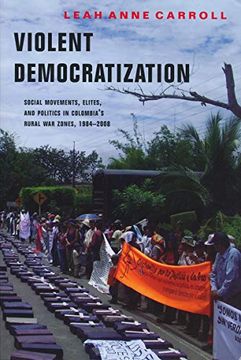Violent Democratization: Social Movements, Elites, and Politics in Colombia's Rural war Zones, 1984-2008 (Helen Kellogg Institute for International Studies)
Synopsis "Violent Democratization: Social Movements, Elites, and Politics in Colombia's Rural war Zones, 1984-2008 (Helen Kellogg Institute for International Studies)"
In Violent Democratization, Leah Anne Carroll analyzes peasant and rural worker mobilization, as well as elite reaction, in Colombia's war zones over a period of twenty-five years and across three regions. Due to Colombia's long history of electoral democracy coinciding with weak state institutions, armed insurgencies, strong social movements, and violent responses from elites and the state, Carroll presents Colombia as a clear-cut national case of "violent democratization." Relying primarily on her interviews with leftist and social movement activists, elected officials, and some elites, as well as on electoral data and archival sources, Carroll reconstructs the political history of key county governments, providing a detailed account of the struggles for local power between elites, on the one hand, and rural agriculturalists and workers, on the other. Carroll analyzes the ways in which the tactics of social movements and elites shifted as national political trends moved from greater political freedom, rapid decentralization, and peace overtures toward guerrilla groups characteristic of the 1980s and early 1990s, to the reversal of these trends and the major escalation of armed conflict and U.S. military aid thereafter. In all three regions, peasant, worker, and neighborhood movements, aided by leftist elected officials, initially gained significant victories. Their successes provoked a violent elite counteroffensive against activists, involving both military and elite-supported paramilitary forces. In response, however, a second wave of activism promoted human rights demands and sought international support to confront the violence of both the Right and the Left. Within these commonalities, Carroll's three regional case studies (Uraba, the Middle and Lower Caguan Valley, and Arauca, producing bananas, coca, and oil, respectively) demonstrate how geographical location and the unique characteristics of the activist movements and regional elites (plantation owners, oil companies, cattle ranchers, and the military and paramilitary forces themselves) shaped each movement's tactics, unity, and success. "Leah Anne Carroll's Violent Democratization is an extraordinary work of scholarship that makes an important contribution to the study of recent Colombian politics and raises important theoretical and political questions that transcend the Colombian case. Carroll's interviews with activists in the three regions she studies, done in the late 1980s and early 1990s at personal risk to herself, provide a wealth of data and analysis heretofore unavailable to scholars. Her explanation of the differences she found among the regions will stimulate debate on crucial questions central to understanding Colombia's contemporary political crisis and the question of Latin American democratization more generally." --Charles Bergquist, University of Washington, Seattle "How can social movements survive and promote progressive change in the face of violent repression? For anyone interested in answering this question, Leah Carroll's book is an invaluable gift. Solidly grounded in incredible field research and twenty years of painstaking analysis, Carroll's comparison of regional political outcomes in Colombia's violent countryside is a major addition to the existing literature that should be read and studied with care by scholars and activists alike." --Peter Evans, University of California, Berkeley "This book is a remarkable contribution to theoretical debate and empirical knowledge of societies involved in long duration conflicts, in a context of undeniable democratization processes. It will enrich the renewed debate on the crisis of the institutions and political representation in Latin America." --Gonzalo Sánchez Gómez, IEPRI, Universidad Nacional de Colombia

